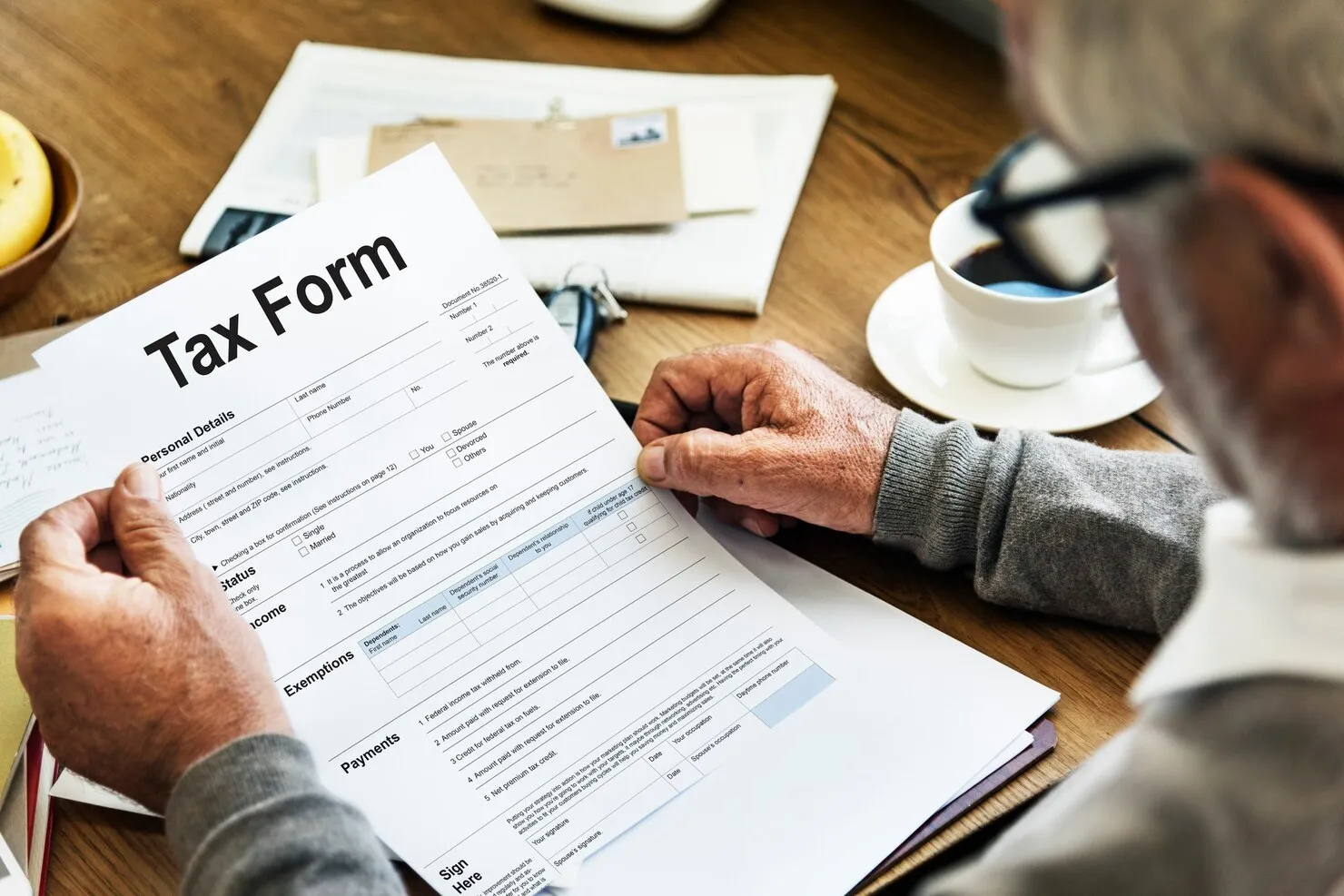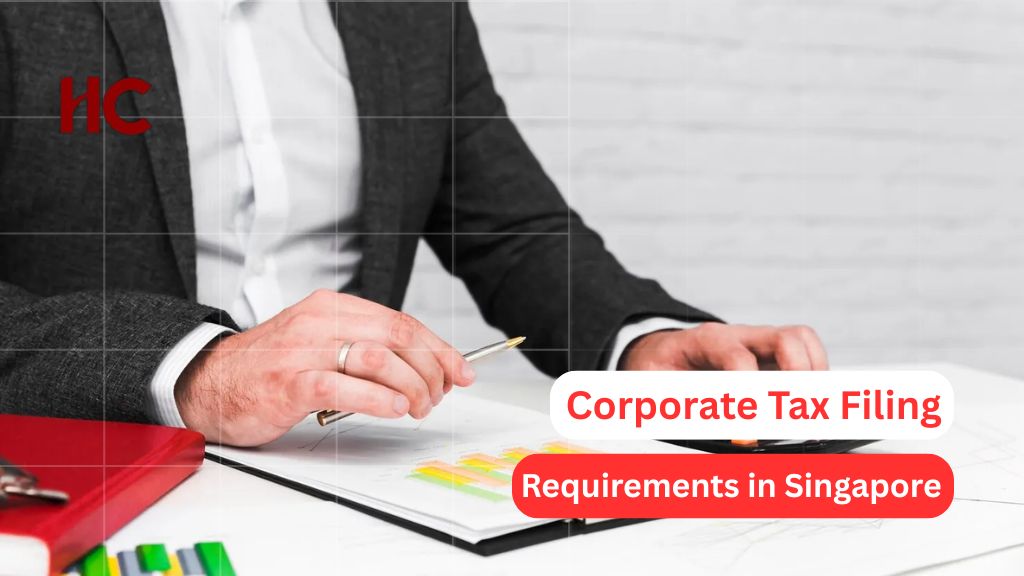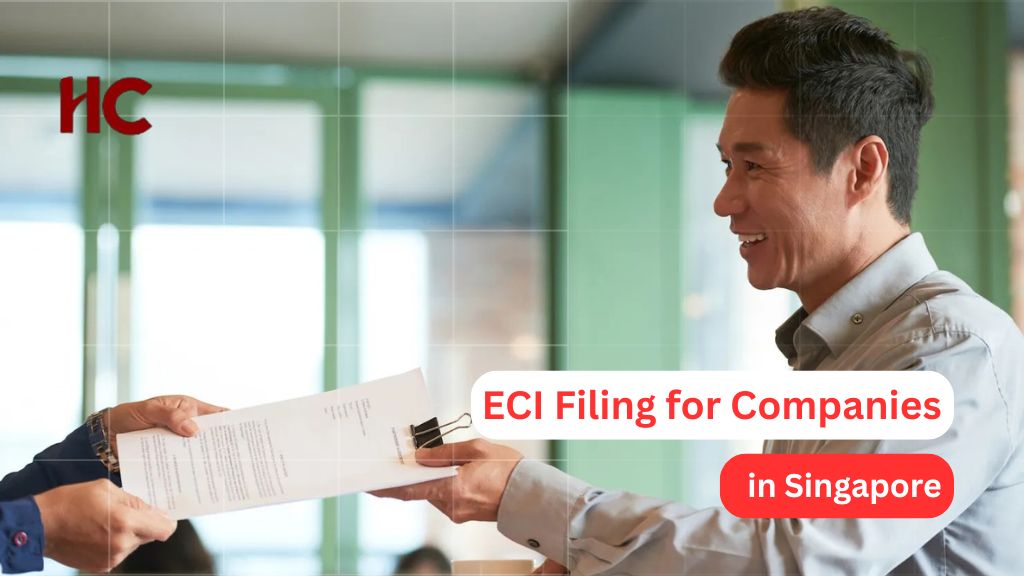Corporate tax filing is an annual requirement for all companies operating in Singapore. Most business owners find themselves with multiple timelines such as ECI submissions, annual returns, and payment schedules – often while trying to run their business at the same time.
We help companies navigate their Singapore corporate tax filing obligations, from preparing ECI to handling Form C-S, Form C-S Lite, and Form C submissions.
Here’s what you need to know about your filing timeline and requirements.
How Corporate Income Tax Works in Singapore
Singapore taxes companies on their chargeable income, which essentially means your taxable profits after you’ve deducted allowable business expenses. The corporate income tax rate is 17%, applied to your company’s chargeable income.
This includes income from:
- Business operations and trading activities
- Investment returns (dividends and interest)
- Royalties and intellectual property
- Rental income and property gains
- Other revenue sources
One aspect that makes Singapore attractive for businesses is its territorial tax system. If your company brings in foreign-sourced income, you may qualify for tax exemptions under certain conditions, which can significantly reduce your overall tax burden.
Corporate Tax Filing Timeline

Understanding the timeline is important because missing deadlines can result in penalties. Your corporate tax obligations follow a specific sequence throughout the year.
Estimated Chargeable Income (ECI)
Your first filing obligation is the ECI, which is an estimate of your company’s taxable profit for a Year of Assessment. You need to file this within three months after your financial year-end. So if your financial year ends on 31 December, your ECI is due by 31 March.
The ECI gives IRAS an early indication of your company’s tax position. One important point is not to include start-up tax exemptions or partial tax exemptions in your ECI calculation. IRAS will apply these automatically when they process your return.
Not all companies need to file an ECI. If your annual revenue is S$5 million or less and you don’t have any estimated chargeable income for the year, you’re exempt.
Certain entities like foreign universities, approved unit trusts, and specific REITs are also exempt from this requirement.
To file your ECI, you’ll need to be set up as an ‘Approver’ for Corporate Tax in CorpPass, and you’ll use your SingPass to access the IRAS myTax portal. Having your company’s UEN ready and your financial figures prepared will make the process smoother.
Also Read: Corporate Service Providers Act 2024 takes effect on 9 June 2025
Annual Corporate Tax Return
After you’ve submitted your ECI, the next milestone is your annual corporate tax return Singapore. This is where you report your actual income for the year, and the deadline is 30 November annually.
Singapore operates on a preceding year basis, which means for Year of Assessment 2025, you’re reporting income earned from 1 January, 2024 to 31 December, 2024.
All companies must e-file Form C-S or the appropriate form type electronically, paper submissions aren’t accepted.
Form C-S
Form C-S is an abridged version of Form C that the Singapore government introduced to simplify tax filing for small companies. It consists of a statement of your company’s eligibility, tax adjustments, and financial accounts.
One significant advantage is that you don’t need to submit financial statements and tax computations with your filing, though you should have them ready in case IRAS requests them.
Your company can file Form C-S if you meet all these requirements:
- Incorporated in Singapore
- Annual revenue of S$5 million or below
- Only derives income taxable at the current corporate tax rate of 17%
- Not claiming any of the following for the Year of Assessment: carry-back of current year capital allowances or losses, group relief, investment allowance, or foreign tax credit and tax deducted at source
Form C-S Lite
If your company qualifies for Form C-S and has annual revenue of less than S$200,000, you can file the even simpler Form C-S Lite.
This version requires only six essential fields to be completed, making it the fastest option for smaller businesses. Like Form C-S, you don’t need to submit financial statements and tax computations with your filing.
Form C
Companies that don’t meet the Form C-S eligibility criteria must file Form C. This is the comprehensive corporate income tax return typically used by larger businesses or those with more complex tax situations.
Unlike Form C-S, you must submit your financial statements, tax computation, and other supporting documents together with Form C.
Also Read: Singapore Budget 2025: A Business-Centric Guide to Cost Savings, Competitive Edge, and Innovation Support
What You Need to Prepare

To e-file Form C-S and Form C-S Lite, while IRAS doesn’t require you to submit documents unless requested, you should have these ready:
- Audited or unaudited financial statements
- Tax computation and supporting schedules
- Declaration to claim writing-down allowances for intellectual property rights under Section 19B of the Income Tax Act 1947 (if applicable)
- Other relevant supporting documents
To e-file Form C, you must submit these documents in PDF format:
- Audited or unaudited financial statements
- Detailed profit and loss statement
- Tax computation and supporting schedule
- Revised tax computations for previous Years of Assessment (if claiming loss carry-back relief or reporting previously unreported income)
- Respective R&D claim forms (if claiming tax benefits from R&D spending)
- Declaration to claim writing-down allowances for IPRs under Section 19B (if applicable)
- Form IRIN 301
Companies that maintain good financial records throughout the year find the filing deadlines in Singapore much less stressful to meet.
Your company will be taxed at Singapore’s corporate income tax rate of 17% on your chargeable income.
However, qualifying companies may benefit from partial tax exemptions or start-up tax exemptions that can significantly reduce the effective tax rate, particularly in the early years of operation.
Notice of Assessment and Payment
Once you’ve filed your returns, IRAS will review your submission and issue a Notice of Assessment (NOA), typically by 31 May of the following year. This document outlines your final tax liability and includes any adjustments IRAS has made to your calculations.
You have 30 days from the date of the NOA to make your payment. If you disagree with the assessment, you also have the right to object during this period.
Payment options include:
- GIRO (recommended – offers up to 10 months of interest-free installments)
- PayNow QR
- Internet banking
- AXS stations
- Telegraphic transfers
GIRO is generally the preferred method because it helps with cash flow management through installment payments. Late payment triggers interest charges at 13% per annum, so it’s worth prioritizing this deadline.
Also Read: Corporate Bank Account Opening in Singapore for Foreign Companies
Working with HC Consultancy
If you’re looking for support with your Singapore corporate tax filing, we can help. We handle everything from ECI preparation to complex Form C submissions, and we’re experienced with businesses across different industries and structures.
We can offer customized solutions if you need assistance with a single filing or ongoing tax advisory support.
Corporate tax filing doesn’t have to be overwhelming. With the right preparation and support, you can meet your obligations efficiently while ensuring you’re not paying more tax than necessary.
Frequently Asked Questions
1. When Is The Filing Due Date?
The annual filing due date for Form C-S, Form C-S Lite, and Form C is 30 November.
2. Who Needs To File Form C?
All companies carrying on a trade or business in Singapore must report their income to IRAS annually by filing their Corporate Income Tax Returns (Form C-S, Form C-S Lite, or Form C).
Form C-S is a simplified Corporate Income Tax Return for qualifying small companies to report their income to IRAS. There are fewer fields in Form C-S than Form C.
3. Do I Need To Be Authorised Before I Can File Form C?
Yes, the company’s employee or a third party has to be authorised in Corppass. To complete, approve and submit the Form C to IRAS, an employee or a third party must be authorised as an “Approver” for “Corporate Tax (Filing and Applications)” in Corppass.
An employee or a third party authorised as a “Preparer” for “Corporate Tax (Filing and Applications)” can only complete the Form C for submission to the “Approver”.
4. Do I Need To File If My Company Made A Loss?
Yes, all companies must file annual tax returns regardless of profitability. Documenting losses is important because they can be carried forward to offset future profits, reducing your tax liability in profitable years.
5. Can I File My Own Corporate Taxes In Singapore?
Yes, you can file your own taxes. However, many businesses choose to work with a tax filing company to ensure accuracy and optimize their tax position.
The complexity of tax regulations means even small errors can result in penalties or missed opportunities for legitimate tax savings.


